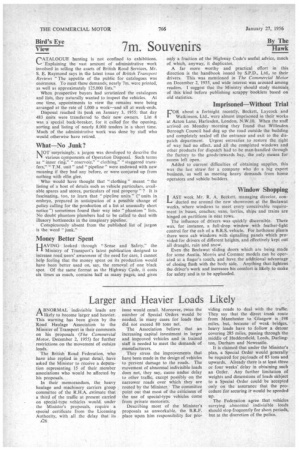Larger and Heavier Loads Likely
Page 28

If you've noticed an error in this article please click here to report it so we can fix it.
ABNORMAL indivisible loads are In, likely to become larger and heavier. This warning has been given by the Road Haulage Association to the Minister of Transport in their comments on his proposals (The Commercial Motor, December 2, 1955) for further restrictions on the movement of outsize loads.
The British Road Federation, who have also replied in great detail, have asked the Minister to receive a deputation representing 15 of their member associations who would be affected by his proposals. In their memorandum, the heavy haulage and machinery carriers group committee of the R.H.A. xstimate that a third of the traffic at present carried on special-type vehicles would, under the Minister's proposals, require a special certificate from the Licensing Authority, with all the delay that its
issue would entail. Moreover, twice the number of Special Orders would be needed, in many cases for loads that did not exceed 80 tons net.
The Association believe that an increasing capital investment in larger and improved vehicles and in trained staff is needed to meet the demands of .manufacturers. They stress the improvements that have been made in the design of vehicles to prevent damage to the roads. The movement of abnormal indivisible loads does not, they say, cause undue delay to other traffic, except possibly on the narrower roads over which they are routed by the Minister. The committee point out that most of the criticisms of the use of special-type vehicles come from private motorists. Describing most of the Minister's proposals as unworkable, the B.R.F. place upon him responsibility for pro viding roads to deal with the traffic. They say that the direct trunk route from Manchester to Glasgow is 198 miles, but, because of weak bridges, heavy loads have to follow a detour covering 285 miles, passing through the middle of Huddersfield, Leeds, Darlington, Durham and Newcastle. It is claimed that under the Minister's plan, a Special Order would generally be required for payloads of 85 tons and upwards. Already there is at least three or four weeks' delay in obtaining such an Order. Any further limitation of weights and dimensions of loads subject to a Special Order could be accepted only on the assurance that the procedure for securing it would be speeded up. The Federation agree that vehicles carrying abnormal indivisible loads should stop frequently for short periods, but at the discretion of the police.




































































